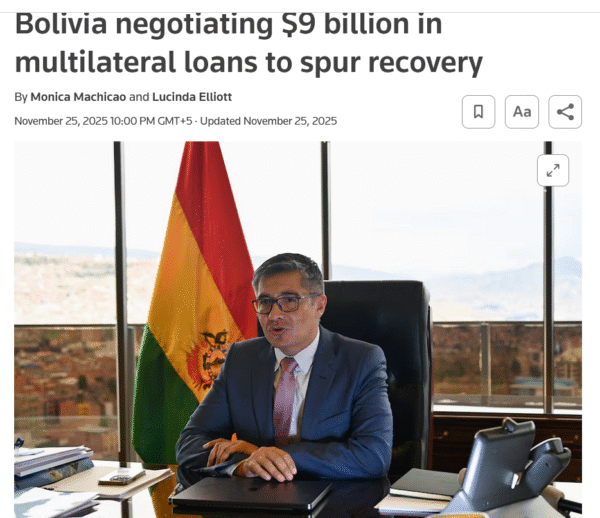Bolivia plans to integrate crypto and stablecoins into its financial system. This aims to modernize the economy, allowing banks to custody crypto.
The government of Bolivia will integrate cryptocurrencies and stablecoins into its financial system. This drive is trying to modernize the economy of the country. On Tuesday, Bolivia announced this by its economic minister, Jose Gabriel Espinoza. This will be a major policy departure of the country.
Bolivia Embraces Crypto to Modernize Economy
Cryptos will be permitted to be held in banks on behalf of customers. This will provide the legal currency for digital currencies. According to Reuters, they can be applied to savings accounts, credit products, and loans. Such a wide integration is indicative of a proactive approach.
The aid talks were announced by Espinoza at a press conference on Tuesday, and he signaled that about a third of that financing would be received within 60 to 90 days. This is funding to supplement the crypto integration plans.
Related Reading: Crypto News: Bolivia Considers Interbank CBDC Amid Rising Stablecoin Usage | Live Bitcoin News
The U.S dollar bonds of Bolivia increased on Tuesday. The two were trading at their best levels since 2022. This was approximately 92 cents on the dollar each as per LSEG records. Bolivian bonds have increased by as much as 60 percent in the current year. This makes them among the best performers in the emerging market bond index of JPMorgan.
It is not the borrowing of the public sector, Espinoza said. This is a new step in development. Its role in the private sector will be very significant, he added. This underscores a change towards a diversified economic policy.
Bolivia is a leading producer of natural gas and grains, with an economic crisis. It is among its worst decades in decades. The foreign investment was discouraged by years of state-heavy policies and nationalization under the old socialist regime.
Paz, who assumed office on November 8, has said that he would focus on a market-oriented approach. This is intended to make foreign investment. It also tries to prevent sudden changes in the economy. As a result, this may sabotage the Bolivian social safety net.
New Policies and Tax Reforms to Attract Investment
The government also repealed the wealth tax in the country as part of the announcement on Tuesday. It quoted its discouragement of investment. Financial taxes were also removed. These strategies are meant to boost economic activity.

However, the new credit lines and tax measures are yet to be passed by Congress. They will not become effective preceding this. This is a legislative move that is essential.
Plans were announced by the Economy Minister of Bolivia, Jose Gabriel Espinoza. They combine cryptocurrencies, beginning with stablecoins such as USDT. This will be in the financial system of the country. Moreover, this is a huge departure compared to the serious ban on crypto that was in place in the country. That ban was lifted in June 2024.
However, this change is characterized by new policies and context. The legal environment is based on the campaign to lift the crypto ban in Bolivia in June 2024. As a result, this has now made it possible to transact crypto.
There is also an expansion in banking services. In the new plan, Bolivian banks will have the opportunity to provide crypto-related services. These are crypto savings accounts and crypto-based credit cards.
Lastly, this trend is emphasized in the recent corporate adoption. Before formal adoption, Bolivia already had businesses that accepted USDT as payment. As an example, distributors of cars, such as Toyota, started accepting USDT in September 2025.





